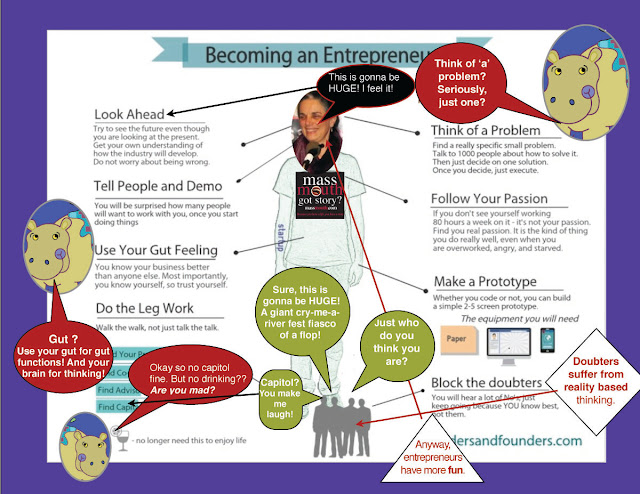 |
| Thanks to Paula for this graphic |
http://www.nytimes.com/2010/
09/19/business/19entre.html
Just Manic Enough: Seeking Perfect Entrepreneurs
"...this thought exercise hints at a truth: a thin line separates the temperament of a promising entrepreneur from a person who could use, as they say in psychiatry, a little help. Academics and hiring consultants say that many successful entrepreneurs have qualities and quirks that, if poured into their psyches in greater ratios, would qualify as full-on mental illness.
Which is not to suggest that entrepreneurs ...are crazy. It would be more accurate to describe them as just crazy enough.
“It’s about degrees,” says John D. Gartner, a psychologist and author of “The Hypomanic Edge.” “If you’re manic, you think you’re Jesus. If you’re hypomanic, you think you are God’s gift to technology investing.”
The attributes that make great entrepreneurs, the experts say, are common in certain manias, though in milder forms and harnessed in ways that are hugely productive. Instead of recklessness, the entrepreneur loves risk. Instead of delusions, the entrepreneur imagines a product that sounds so compelling that it inspires people to bet their careers, or a lot of money, on something that doesn’t exist and may never sell.
So venture capitalists spend a lot of time plumbing the psyches of the people in whom they might invest. It’s not so much about separating the loonies from the slightly manic. It’s more about determining which hypomanics are too arrogant and obnoxious — traits common to the type — and which have some humanity and interpersonal skills, always helpful for recruiting talent and raising money."...people will tell you that what you’re doing can’t be done, and if it could be done, someone would have done it already."
Some V.C.’s have personality tests to help them weed out the former. Others emphasize their toleration of mild forms of mania, if only because starting a business is, on its face, a little nuts."...because starting a business is, on its face, a little nuts."
“You need to suspend disbelief to start a company, because so many people will tell you that what you’re doing can’t be done, and if it could be done, someone would have done it already,” says Paul Maeder, a general partner at Highland Capital. “There are six billion human beings on this planet, we’ve been around for hundreds of thousands of years, we’re a couple hundred years into the industrial revolution — and nobody has done what you want to do? It’s kind of crazy.”
